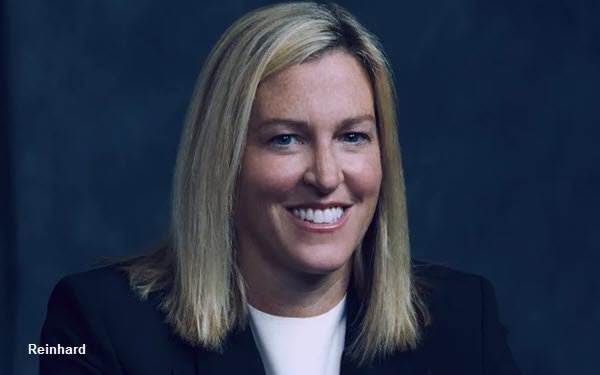
Amy Reinhard has been promoted to
Netflix’s new president of ad sales, replacing Jeremi Gorman, who led the advertising business during the first year of the streaming service’s ad-supported tier launch.
Netflix has also promoted Eunice Kim to chief product officer and Elizabeth Stone to chief technology officer. Kim is currently vice president consumer product innovation and Stone is vice
president data and insights.
Reinhard was named vice president, studio operations for Netflix in 2020. She joined the company in 2016 as vice president of content acquisition, and has
overseen global studio licensing for films and TV series and local-language acquisitions, physical production, production facilities management and consumer products and creative services. Prior to
Netflix, she was at Paramount Pictures for more than a decade, ultimately serving as president of worldwide TV licensing and distribution.
advertisement
advertisement
Gorman left a post as chief business officer at
Snap to join Netflix in September 2022 — just two months before the company launched its ad-supported Basic with Ads plan in the U.S. and 11 other countries — and said she is leaving
“to build again,” adding that her passion is for “scaling businesses from the early stages, which I have done many times —none more exciting than Netflix.”
Prior to Snap, Gorman served as global head of enterprise advertising sales at Amazon Advertising and in various roles at Monster.com, Yahoo and Variety.
In a statement,
Netflix Co-CEO Greg Peters thanked Gorman for “building our ads business from scratch” in just a year, “attracting world-class brands” and “an incredible
team.”
In seven years at Netflix, Reinhard “has proven to be an exceptionally strong leader, with a deep understanding of the entertainment business and consumer tastes, as
well as the ability to build lasting partnerships across the industry,” Peters said. It is not yet clear who will succeed Reinhard in the studio operations post.
Gorman said she had
witnessed Reinhard’s “operational excellence and entertainment expertise firsthand” in working with her for the past year, and predicted that advertisers will benefit from
Reinhard’s leadership in “new and remarkable ways.”
Advertisers were eager to invest in ad-supported Netflix tier, even elevated CPMs as high as $65. But the new offering got
off to a rough start when the tier missed viewer guarantees in some markets, causing Netflix to let advertisers push some of their investments into 2023.
The Basic with Ads plan had attracted
more than five million global monthly active users by May of this year, and 10 million by August.
The plan’s first upfront reportedly met Netflix’s expectations. However,
during its Q2 earnings call, CFO Spence Neuman said that advertising still had a long way to go to produce enough revenue to be material to the business, adding that the company hoped it would reach
10% of total revenue “over time.”
By July, Netflix reportedly had moderated its CPMs to be more in line with competitors, and renegotiated its initially exclusive deal with
ad-tech partner Microsoft to gain more flexibility.
Netflix also reported that the ad-supported tier, which costs subscribers $6.99 per month, was generating about $8.50 per month in ad
revenue per subscriber, and that its average revenue per user/member (ARPU or ARPM) was higher than that of the $15.49-per-month Standard ad-free plan. In June, Netflix dropped its cheapest,
$10-per-month "basic" no ads plan in order to push new subscribers toward the ad-supported option.
In their new roles, Kim and Stone will both report to Peters.
The two
executives “have strong track records at Netflix and more broadly within the technology industry,” Peters said in announcing their promotions. “Together they will be leading a hugely
important part of our service,” including “making it even easier for people to find the right movie, series or game at the right moment.”
Peters, who was promoted to co-CEO
alongside Ted Sarandos nine months ago, focuses on technology and products, including gaming, while Sarandos focuses on content and marketing.